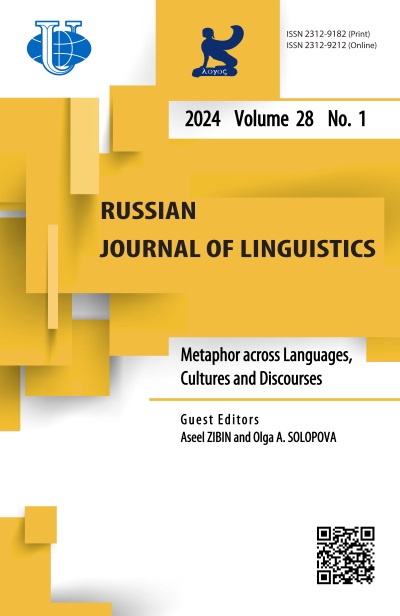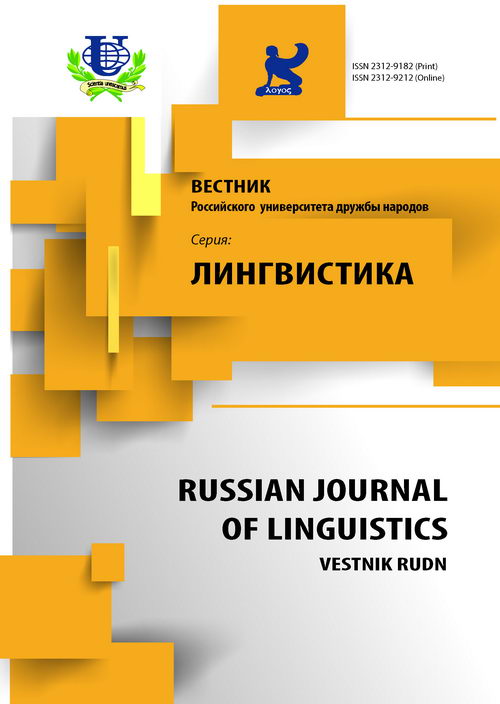No 2 (2014)
- Year: 2014
- Articles: 23
- URL: https://journals.rudn.ru/linguistics/issue/view/578
Articles
Editorial
Russian Journal of Linguistics. 2014;(2):5
 5
5


Man, Family, Society: Semantic Shifts from Latin to Romance Languages
Abstract
The article is devoted to the analysis of some semantic shifts from Latin to Romance languages and in Romance languages per se in lexemes denominating kinship ties and age of a person in the Italo-Romanic area. The article reviews formation of meaning of words denoting a child. in Italian and Italian dialects with due consideration of Romance parallels.
Russian Journal of Linguistics. 2014;(2):6-10
 6-10
6-10


Perspectives of The Development of Spanish
Abstract
Spanish as Castellano spoken in Spain or Spanish spoken in Latin America... What can we say about this language? Do we really mean the language and its variety or do we speak about different languages? Are there perspectives of the development of Spanish and what are they? The article considers these and many other issues.
Russian Journal of Linguistics. 2014;(2):11-15
 11-15
11-15


Russian is a Multinational Language?
Abstract
The article is devoted to un urgent problem of modern linguistics: variability («multi-variant») of the Russian language, which has its supporters and opponents. The author of the article offers a third way - a way of combining criticism of episteme supporters of this idea and knowledge production from accumulated experience in the science of language.
Russian Journal of Linguistics. 2014;(2):16-30
 16-30
16-30


Language Situation and Language Policy in New Zealand
Abstract
The article considers specific features of the language situation and the language policy in New Zealand. The author takes into consideration the social status of English and Maori, draws reader’s attention to the state policy of the Ministry of education of New Zealand and the activities of governmental and non-governmental organizations concerning the English language, Maori and the New Zealand Sign Language. The author analyzes New Zealand state reforms, aimed at cultivation of the cultural, educational and communicative value of the Maori language and culture. The paper draws attention to the growth of ethnic consciousness of the Maori people, communicative expansion of the Maori language usage in public, political, educational, scientific and cultural spheres of New Zealand.
Russian Journal of Linguistics. 2014;(2):31-41
 31-41
31-41


The Role of the English Language in Nigeria
Abstract
The article examines the role of the English language in Nigeria, a major West African country with a highly diverse ethnic composition of the population and a very complex linguistic situation. While English is the official language, there are more than 500 indigenous languages in Nigeria. Nigerian Pidgin English is a popular means of interethnic communication and a marker of solidarity between the various groups. The article analyzes the role of English in introducing Nigerians to modern knowledge, creating new types of thinking and contributing to the development of national self-awareness. At the same time, the paper points out how the English language is adapted to reflect African mentality and African world view.
Russian Journal of Linguistics. 2014;(2):42-53
 42-53
42-53


On the Usefulness of English Borrowings in Russian Terminological Systems
Abstract
The article analyses the development of Russian “newborn” terminological systems (LSP of economics, business, advertisement, etc.) and offers criteria, which would allow linguists to qualify borrowed terminological units as objectively “useful” or “harmful” for further expansion of modern Russian terminology. The article further classifies the borrowed terms into “conceptual”, “compact” and “equivalent-free” units. This conventional classification represents an attempt to create an assessment instrument, which aims to determine the potential of a borrowed term for assimilation and successful functioning in the new linguistic system.
Russian Journal of Linguistics. 2014;(2):54-62
 54-62
54-62


Stylistic Features in Academic Discourse
Abstract
While comparing styles of discourse in academic settings across cultures a scholar faces a number of problems since structural similarity of linguistic units does not result in their stylistic equivalence. The paper examines the nature of the problems that arose in the course of comparing three articles on television discourse written in English and Russian by native and non-native speakers. It argues that the ways in which these linguistic units function in academic discourse of a particular culture can be determined only as a result of careful analysis of context and in view of a whole gamut of culturally specific means of realizing communicative meanings.
Russian Journal of Linguistics. 2014;(2):63-71
 63-71
63-71


 72-80
72-80


Acoustic Characteristics of Stressed Front Vowels in the French speech of Russian and Mari people
Abstract
The article describes the spectral characteristics of stressed front vowels in the French speech of native speakers, Russian, Hill and Meadow Mari speakers under conditions of «artificial» bilingualism. Vowel spectra were determined by the F-picture (the first two formants). The research revealed that Russian and Mari native speakers demonstrate an ability to differentiate the rise of French vowels more frequently. Correct pronunciation of a number of French vowels is observed more frequently in the speech of the Hill Mari, more rarely- in the speech of the Meadow Mari. Russian speakers hardly differentiate vowel rows. However, the "poor" quality of speech in a foreign language does not prevent one from good understanding due to the fact that for a bilingual speaker the sounding of tokens on the morphemic level becomes less relevant than the meaning. Sufficiently deep immersion into lifestyle, behavior of speakers of another language can help achieve a real image of the picture of another language.
Russian Journal of Linguistics. 2014;(2):81-95
 81-95
81-95


“Russia and Spain: The Dialogue of Cultures”. Teaching Language, Culture, and Communication
Abstract
The process of intercultural integration at the national and international level has been instrumental for the modernization of the contents of foreign language education in Russia and Europe. The article deals with theoretical principles underlying intercultural communication textbooks. Particular attention is paid to the dialogue of two cultures, presented as a dialog of texts in a new textbook for Spanish students learning Russian and for Russian students learning Spanish “Russia - Spain: Dialogue of Cultures”.
Russian Journal of Linguistics. 2014;(2):96-106
 96-106
96-106


Peculiarities of Communicative Style in The Advertisement Genre in English and Russian University On-line Communication Discourse Analysis
Abstract
Intercultural communicative competence is one of the integral parts of translators’ skills. The article analyses national and cultural peculiarities of English and Russian communicative styles in the advertisement speech genre in university on-line communication to address the problem of translatability of lexical units. Furthermore, the study explains the use of particular linguistic means and communication strategies as related to the specific features of Anglo-Saxon and Russian linguistic cultures.
Russian Journal of Linguistics. 2014;(2):107-113
 107-113
107-113


Somatisms in Phraseological Africanisms
Abstract
This article examines the place of somatisms as part of phraseological Africanisms, focusing on the group “body parts”, specifically somatisms with lexical items “heart” and “blood”. The paper discusses the meaning of such somatisms, by descrbing the whole range of characteristics that affect the use of these somatisms and comparing their meaning and function in European and African cultures.
Russian Journal of Linguistics. 2014;(2):114-124
 114-124
114-124


National Identity in Quebec Linguistic Consciousness
Abstract
The problem of defining the structure of national identity takes central place in current research. The paper examines the category of national identity through the lens of the linguo-cultural paradigm. Specifically, the content of the concepts identity , Quebec , Quebecois , the French language and distinct society are analyzed. The results of the experiments demonstrate that historic traditions, national self-identity and the value of the French language are the most important characteristics of Quebec national identity.
Russian Journal of Linguistics. 2014;(2):125-133
 125-133
125-133


Military Slang in the Context of Ethnic Stereotyping
Abstract
The article touches upon the social-group dialect as a linguistic means of realization of the US military ethnic stereotyping. The study of the linguo-cultural phenomenon reveals both group and individual world perception mechanisms of the military, identifies the system of moral values as well as reflects typical features the verbal portrait of the US Armed Forces military collective image. Based on authentic lexical and phraseological items of the military jargon, a stereotype classification of the collective image of the US servicemen has been presented.
Russian Journal of Linguistics. 2014;(2):134-144
 134-144
134-144


Manipulation Impact through Metaphors in Political Discourse
Abstract
The article covers the metaphorical modeling in a political discourse as one of linguistic manipulation impact means. Political speech exercising a motivation function use symbols in order to link concepts which are not often even adjoined. And it’s a metaphor that plays one of leading roles in this process. Communication needs stable metaphors. It’s very important to use this linguistic means in a political discourse as it’s able to form a positive stock phrase and a negative figure. The summation of metaphors in a definitive conceptual domaine of a political discourse form part of a metaphorical model that is an universal epistemological category expressing a general discourse semantics and organizing special mentality stereotypes for a message recipient. The article is designed for students and post-graduate students specialized in philology, lecturers and professors of linguistics and foreign languages, scientists and amateurs.
Russian Journal of Linguistics. 2014;(2):145-158
 145-158
145-158


Benefactive Constructions in Japanese
Abstract
Two Japanese benefactive constructions are explored in the article: converb form of the verb -te/-de plus kudasaru and converb form of the verb -te/-de plus kureru. Semantic verb subclasses, capable of generating those constructions, are analyzed. A classification of types and kinds of beneficiaries, i.e. “positively affected participants” of the situation indicated by the verb of the benefactive construction and its environment, is suggested.
Russian Journal of Linguistics. 2014;(2):159-168
 159-168
159-168


“Diálogo de la lengua” (1535-36) by Juan de Valdés. From Form to Content
Abstract
This article is dedicated to “Diálogo de la lengua” (1535) by a Spanish grammarian of the Renaissance Juan de Valdés whose personality and works are not so widely known in Russia. “Diálogo de la lengua” represents the Renaissance dialogue, heir to the Greek-Latin traditions and is dedicated to the Castilian language, the interrelation of its norms and Language Usage, stylistic and lexical issues. The attention is focused on the genre features of “Diálogo” and the relationship of the author and the character to represent him in the dialogue. The analysis is conducted in terms of a combination of various stylistic and genres features of the language in the “Diálogo” making it possible to distinguish the traits of scientific style in the work (and to consider the “Diálogo de la lengua” as a grammar of the Castilian language and linguistic comment), as well as a work of art (scenic or philosophical Socratic dialogue).
Russian Journal of Linguistics. 2014;(2):169-177
 169-177
169-177


Urgent Issues of Linguistics
Russian Journal of Linguistics. 2014;(2):178-190
 178-190
178-190


Conference Review
Russian Journal of Linguistics. 2014;(2):191-193
 191-193
191-193


In memoriam
Russian Journal of Linguistics. 2014;(2):194-207
 194-207
194-207


Our contributors
Russian Journal of Linguistics. 2014;(2):208-209
 208-209
208-209


Information for contributors
Russian Journal of Linguistics. 2014;(2):210-211
 210-211
210-211

















